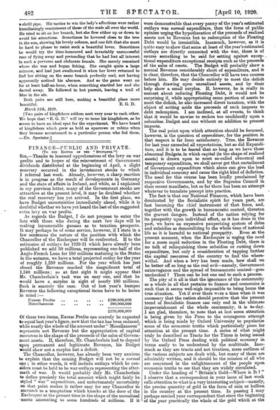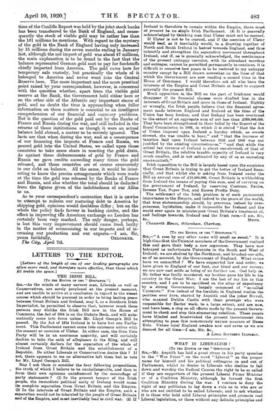FINANCE--PUBLIC AND PRIVATE.
[To THE EDITOR or THE " SpEenzon."] SIR,—Thanks to lessened apprehensions of the levy on war profits and to hopes of the reinvestment of Government dividends distributed at the beginning of April, a slight recovery occurred in the investment stocks to which I referred last week. Already, however, a sharp reaction is in progress as the result of developments in Germany and the state of affairs in Ireland, and while, as I explained in my previous letter, many of the Government stocks are attractive at the present level, it may be doubted whether the real recovery has yet arrived. In the first place, we have Budget uncertainties immediately ahead, while it is doubtful whether we have yet heard the last of the suggested extra levy on war profits.
As regards the Budget, I do not propose to enter the lists with those who during the next few days will be making innumerable guesses as to taxation prospects. It may perhaps be of some service, however, if I state in a few sentences the nature of the position with which the Chancellor of the Exchequer will be confronted. If to the estimates of outlays for 1920-21 which have already been published we add 50 millions, representing one-half of the Anglo-French Loan for 100 millions maturing in the States in the autumn, we have a total projected outlay for the year of roughly 1,250 millions. For the year which has just closed the Revenue reached the magnificent total of 1,340 millions ; so at first sight it might appear that Mr. Chamberlain's task was an easy one, and that he would have a surplus in sight of nearly 100 millions. Such is scarcely the case. Out of last year's bumper Revenue the following exceptional items have to be borne in mind :— Excess Profits • • .. £290,000,000
Miscellaneous • • • • • • .. 280,000,000 £570,000,000
Of these two items, Excess Profits can scarcely be expected to equal last year's figure, now that the tax has been reduced, while nearly the whole of the amount under " Miscellaneous " represents not Revenue but the appropriation of capital resources in the shape of the proceeds of the sales of Govern- ment assets. If, therefore, Mr. Chamberlain had to depend upon permanent and legitimate Revenue, his Budget would show not a surplus but a deficit.
The Chancellor, however, has already been very anxious to explain that the coming Budget will not be a normal one ; in other words, it will include outlays which he con- siders must be held to be war outlays representing the after- math of war. It would probably defy Mr. Chamberlain to define precisely the total amount which might fairly be styled " war " expenditure, and unfortunately uncertainty on that point makes it rather easy for any Chancellor to succumb to a temptation which knocks at the door of the Exchequer at the present time in the shape of the unrealized -assets amounting to some hundreds of millions. If it were demonstrable that every penny of the year's estimated outlays was normal expenditure, then the force of public opinion urging the hypothecation of the proceeds of realized assets not to Revenue but to redemption of the Floating Debt would be irresistible. Inasmuch, however, as it is quite easy to'show that some at least of the year's estimated outlays are directly connected with the war, there is of course something to be said for setting against excep- tional expenditure exceptional receipts such as the proceeds of the sales of assets. The Budget will probably show a normal Revenue considerably short of expenditure, and it is clear, therefore, that the Chancellor will have two courses before him. He may decide entirely to meet the deficit through drawing upon unrealized assets, and by their help show a small surplus. If, however, he is really in earnest about reducing Floating Debt, it would not be surprising if, while appropriating some portion of assets to meet the deficit, he also increased direct taxation, with the object of setting aside the proceeds of such imposts to debt redemption. I am inclined, at all events, to think that it would be unwise to reckon too confidently upon a colourless Budget and one without an addition to present imposts.
The real point upon which attention should be focussed, however, is the question of expenditure, for the position in that respect is far from satisfactory. True, the Revenue for last year exceeded all expectations, but so did Expendi- ture, and it is to be feared that so long as we have these abnormal Budgets, in which capital (in the shape of realized assets) is drawn upon to meet so-called abnormal and temporary expenditure, we shall never get that curtailment of Government expenditure which alone can give the lead in individual economy and cause the right kind of deflation. The need for this course has been loudly proclaimed by respective Governments, and by the Supreme Council in their recent manifesto, but so far there has been no attempt whatever to translate precept into practice. The fact is that our National Finances, which have been dominated by the Socialistic spirit for years past, are fast becoming the chief instrument of that force, and, together with the growth in bureaucratic control, threaten the gravest dangers. Instead of the nation relying for its prosperity upon individual effort, as it has done in the past, we have an expensive pauperizing system of doles and subsidies as demoralizing to the whole tone of national life as it is harmful to national prosperity. Even at the present moment, when the Exchequer is urging the need for a more rapid reduction in the Floating Debt, there is no talk of relinquishing these subsidies or cutting down expenditure, but only a consideration of tapping further the capital resources of the country to find the where- withal. And when a levy has been made, how shall we be better off so long as the real evil—namely, Government extravagance and the spread of bureaucratic control—goes unchecked ? There can be but one end to such a process.
The pity of it all is that the ignorance of the community as a whole in all that pertains to finance and economics is such that it seems well-nigh impossible to bring home the true situation. Yet if ever there were a time when it was necessary that the nation should perceive that the present trend of Socialistic finance can only end in the ultimate impoverishment of the whole community, it is to-clay. I am glad, therefore, to note that at last some attention is being given by the Press to the courageous attempt which is being made by Oxford University to popularize some of the economic truths which particularly press far attention at the present time. A series of what might truly be described as Tracts for the Times is being issued by the Oxford Press dealing with political economy in terms easily to be understood by the multitude. Inas- much as they are tracts and not treatises, mere outlines of the various subjects are dealt with, but many of them are admirably written, and it should be the mission of all who are concerned in the enlightenment of the people upon economic truths to see that they are widely circulated. Under the heading of " Britain's Gold—Where is It ? " I observe that a correspondent in your issue of last week calls attention to what is a very interesting subject—namely, the precise quantity of gold in the form of coin or bullion in the country at the present time. In passing I may perhaps remind your correspondent that since the beginning of the year practically the whole of the gold which at the time of the Cunlifle Report was held by the joint stock banks has been transferred to the Bank of England, and conse- quently the stock of visible gold may be rather less than the 1S1 millions he mentions. With regard to the mystery of the gold in the Bank of England having only increased by 15 millions during the seven months ending in January last, although the net import of gold. was about 47 millions, the main explanation is to be found in the fact that the balance represented German gold sent to pay for foodstuffs chiefly imported from America. The gold came here for temporary safe custody, but practically the whole of it belonged to America and never went into the Central Reserve here. The more important and the more practical point raised by your correspondent, however, is concerned with the question whether, apart from the visible gold reserve at the Bank, the Government hold either here or on the other side of the Atlantic any important stores of gold, and no doubt the time is approaching when fuller information on these matters is essential to an intelligent comprehension of our financial and currency problems. Noi is the question of the gold paid. out by the Banks of France and Russia during the war, and still included in the returns of those institutions as though it were an actual balance held abroad, a matter to be entirely ignored. The facts are that when during the war, and as a consequence of our financing the imports of France and Russia, we poured gold. into the United States, we called upon those countries to take some share in meeting the gold drain. As against these disbursements of gold by France and Russia we gave credits exceeding many times the gold released, and those countries are of course enormously in our debt on balance. All the same, it would be inter- esting to know the precise arrangements which were made at the time the gold was released by the Banks of France and Russia, and also whether the total should. be deducted from the figures given of the indebtedness of our Allies to us.
As to your correspondent's contention that it is unwise to attempt to redeem our maturing debt- to America by shipping gold, opinions would doubtless differ ; but on the whole the policy finds favour in banking circles, and the effect in improving the American exchange on London has certainly been very marked. The only danger, perhaps, is lest this very improvement should. cause fresh laxity in the matter of economizing in our imports and of in- creasing our production and our exports.—I am, Sir,



































 Previous page
Previous page